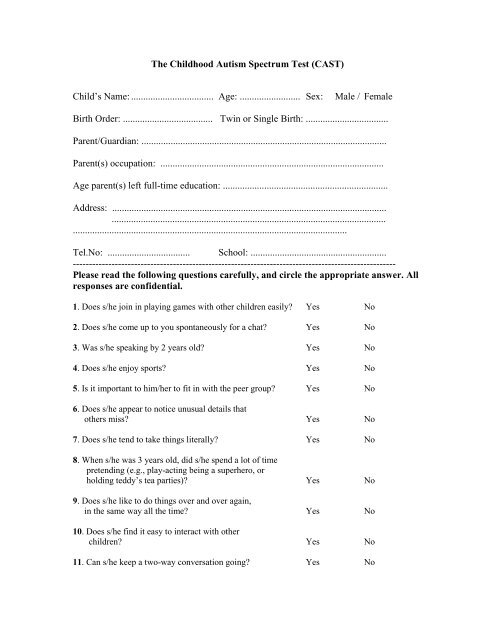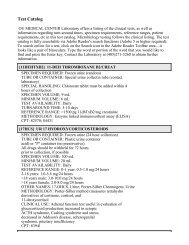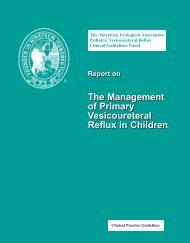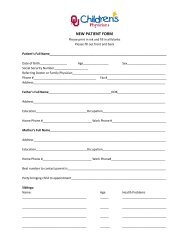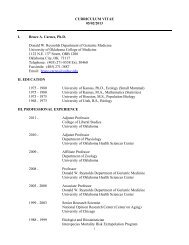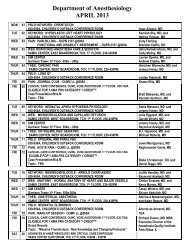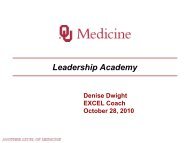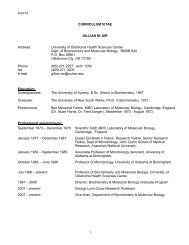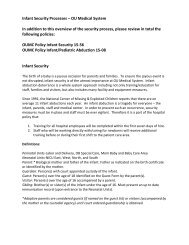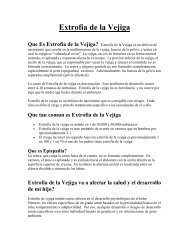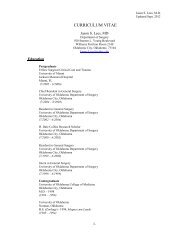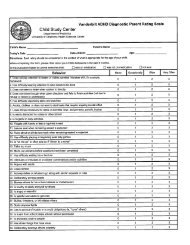The Childhood Asperger Syndrome Test (CAST) - OU Medicine
The Childhood Asperger Syndrome Test (CAST) - OU Medicine
The Childhood Asperger Syndrome Test (CAST) - OU Medicine
Create successful ePaper yourself
Turn your PDF publications into a flip-book with our unique Google optimized e-Paper software.
<strong>The</strong> <strong>Childhood</strong> Autism Spectrum <strong>Test</strong> (<strong>CAST</strong>)<br />
Child’s Name: .................................. Age: ......................... Sex:<br />
Male / Female<br />
Birth Order: ..................................... Twin or Single Birth: ..................................<br />
Parent/Guardian: .....................................................................................................<br />
Parent(s) occupation: ............................................................................................<br />
Age parent(s) left full-time education: ....................................................................<br />
Address: .................................................................................................................<br />
.................................................................................................................<br />
.................................................................................................................<br />
Tel.No: .................................. School: ........................................................<br />
----------------------------------------------------------------------------------------------------<br />
Please read the following questions carefully, and circle the appropriate answer. All<br />
responses are confidential.<br />
1. Does s/he join in playing games with other children easily? Yes No<br />
2. Does s/he come up to you spontaneously for a chat? Yes No<br />
3. Was s/he speaking by 2 years old? Yes No<br />
4. Does s/he enjoy sports? Yes No<br />
5. Is it important to him/her to fit in with the peer group? Yes No<br />
6. Does s/he appear to notice unusual details that<br />
others miss? Yes No<br />
7. Does s/he tend to take things literally? Yes No<br />
8. When s/he was 3 years old, did s/he spend a lot of time<br />
pretending (e.g., play-acting being a superhero, or<br />
holding teddy’s tea parties)? Yes No<br />
9. Does s/he like to do things over and over again,<br />
in the same way all the time? Yes No<br />
10. Does s/he find it easy to interact with other<br />
children? Yes No<br />
11. Can s/he keep a two-way conversation going? Yes No
12. Can s/he read appropriately for his/her age? Yes No<br />
13. Does s/he mostly have the same interests as<br />
his/her peers? Yes No<br />
14. Does s/he have an interest which takes up so much<br />
time that s/he does little else? Yes No<br />
15. Does s/he have friends, rather than just acquaintances? Yes No<br />
16. Does s/he often bring you things s/he is interested<br />
in to show you? Yes No<br />
17. Does s/he enjoy joking around? Yes No<br />
18. Does s/he have difficulty understanding the rules<br />
for polite behaviour? Yes No<br />
19. Does s/he appear to have an unusual memory for<br />
details? Yes No<br />
20. Is his/her voice unusual (e.g., overly adult, flat, or<br />
very monotonous)? Yes No<br />
21. Are people important to him/her? Yes No<br />
22. Can s/he dress him/herself? Yes No<br />
23. Is s/he good at turn-taking in conversation? Yes No<br />
24. Does s/he play imaginatively with other<br />
children, and engage in role-play? Yes No<br />
25. Does s/he often do or say things that are tactless<br />
or socially inappropriate? Yes No<br />
26. Can s/he count to 50 without leaving out any<br />
numbers? Yes No<br />
27. Does s/he make normal eye-contact? Yes No<br />
28. Does s/he have any unusual and repetitive<br />
movements? Yes No<br />
29. Is his/her social behaviour very one-sided and<br />
always on his/her own terms? Yes No<br />
30. Does s/he sometimes say “you” or “s/he” when<br />
s/he means “I”? Yes No
31. Does s/he prefer imaginative activities such as<br />
play-acting or story-telling, rather than numbers<br />
or lists of facts? Yes No<br />
32. Does s/he sometimes lose the listener because of<br />
not explaining what s/he is talking about? Yes No<br />
33. Can s/he ride a bicycle (even if with stabilisers)? Yes No<br />
34. Does s/he try to impose routines on him/herself,<br />
or on others, in such a way that it causes problems? Yes No<br />
35. Does s/he care how s/he is perceived by the rest of<br />
the group? Yes No<br />
36. Does s/he often turn conversations to his/her<br />
favourite subject rather than following what the other<br />
person wants to talk about? Yes No<br />
37. Does s/he have odd or unusual phrases? Yes No<br />
SPECIAL NEEDS SECTION<br />
Please complete as appropriate<br />
38. Have teachers/health visitors ever expressed any<br />
concerns about his/her development? Yes No<br />
If Yes, please specify..................................................................................................<br />
39. Has s/he ever been diagnosed with any of the following?:<br />
Language delay Yes No<br />
Hyperactivity/Attention Deficit Disorder (ADHD) Yes No<br />
Hearing or visual difficulties Yes No<br />
Autism Spectrum Condition, incl. <strong>Asperger</strong>’s <strong>Syndrome</strong> Yes No<br />
A physical disability Yes No<br />
Other (please specify) Yes No


